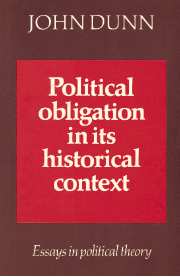Summary
This book is concerned with a mildly eccentric venture, an attempt to recapture intellectually a sense of the shape and character of one of the central theoretical problems in human existence. This problem – roughly, how far human beings have good reason to see and feel themselves as morally constrained by political organisations (villages, parties, armies, states) and morally committed to sustain these in the face of hazard – has never been easy to confront directly. But very drastic historical pressures, both intellectual and social, have made it extravagantly more difficult for us to confront it than it was for the great European thinkers of the seventeenth and eighteenth centuries to do so. In response to these pressures, all too intelligibly, the problem has been shrunk, truncated or trivialised; and purported solutions to it have come to rest more and more blatantly upon parochial cultural pieties or institutionally routinised intellectual habits. Since no one today appears to be in a position to offer (and since it may even be true that no one today could be in a position to offer) a clear and decisive universal solution to this problem, there are evident attractions to the view that both academic modesty and political delicacy dictate that we should leave its full theoretical enormity discreetly unmentioned. Modesty and delicacy are fine values; but in this instance their sway is not without peril. The world is not becoming politically any easier to understand.
- Type
- Chapter
- Information
- Political Obligation in its Historical ContextEssays in Political Theory, pp. 1 - 10Publisher: Cambridge University PressPrint publication year: 1980

